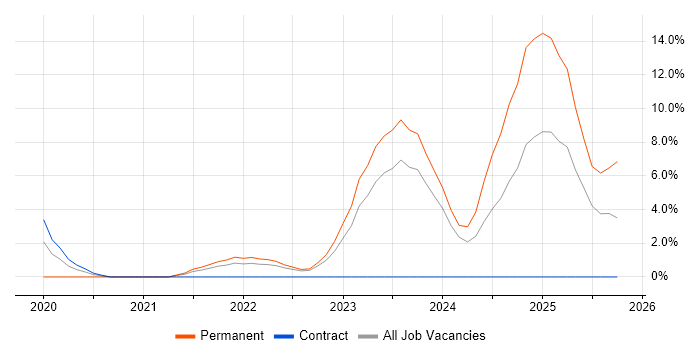Inclusion and Diversity
Lancashire > Preston
The table below looks at the prevalence of the term Inclusion and Diversity in permanent job vacancies in Preston. Included is a benchmarking guide to the salaries offered in vacancies that cited Inclusion and Diversity over the 6 months leading up to 5 November 2025, comparing them to the same period in the previous two years.
| 6 months to 5 Nov 2025 |
Same period 2024 | Same period 2023 | |
|---|---|---|---|
| Rank | 8 | - | 6 |
| Rank change year-on-year | - | - | +34 |
| Permanent jobs citing Inclusion and Diversity | 4 | 0 | 21 |
| As % of all permanent jobs in Preston | 6.25% | - | 14.19% |
| As % of the General category | 17.39% | - | 24.14% |
| Number of salaries quoted | 2 | 0 | 9 |
| 10th Percentile | - | - | - |
| 25th Percentile | - | - | £22,314 |
| Median annual salary (50th Percentile) | £40,000 | - | £22,628 |
| 75th Percentile | - | - | £50,000 |
| 90th Percentile | - | - | £52,500 |
| Lancashire median annual salary | £30,000 | £25,467 | £22,628 |
| % change year-on-year | +17.80% | +12.55% | - |
All General Skills
Preston
Inclusion and Diversity falls under the General Skills category. For comparison with the information above, the following table provides summary statistics for all permanent job vacancies requiring common skills in Preston.
| Permanent vacancies with a requirement for common skills | 23 | 94 | 87 |
| As % of all permanent jobs advertised in Preston | 35.94% | 65.73% | 58.78% |
| Number of salaries quoted | 17 | 62 | 65 |
| 10th Percentile | £34,500 | £30,000 | £23,000 |
| 25th Percentile | £40,000 | £35,250 | £23,500 |
| Median annual salary (50th Percentile) | £50,000 | £49,000 | £45,000 |
| Median % change year-on-year | +2.04% | +8.89% | +6.89% |
| 75th Percentile | £57,000 | £59,736 | £57,500 |
| 90th Percentile | £72,366 | £69,875 | £72,500 |
| Lancashire median annual salary | £40,000 | £50,000 | £47,500 |
| % change year-on-year | -20.00% | +5.26% | +5.56% |
Inclusion and Diversity
Job Vacancy Trend in Preston
Historical trend showing the proportion of permanent IT job postings citing Inclusion and Diversity relative to all permanent IT jobs advertised in Preston.

Inclusion and Diversity
Salary Trend in Preston
Salary distribution trend for jobs in Preston citing Inclusion and Diversity.

Inclusion and Diversity
Co-Occurring Skills & Capabilities in Preston by Category
The following tables expand on the one above by listing co-occurrences grouped by category. They cover the same employment type, locality and period, with up to 20 co-occurrences shown in each category:
